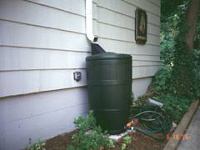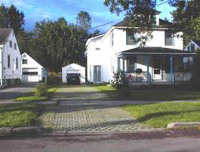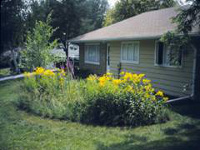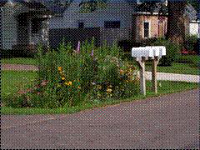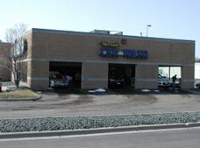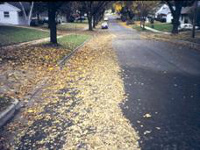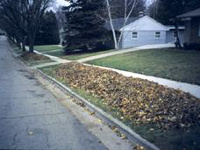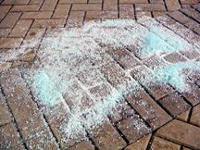What you can do to help
Learn more about storm water runoff
Certain activities like walking your dog or driving your car can leave pollutants on the ground that can wash off in rain water. All the hard surfaces you use every day, such as parking lots, driveways, rooftops, and sidewalks, dramatically increase the rate and amount of runoff. What each of us can do to reduce pollutants in storm water runoff might seem small, but it can all add up to reducing the problems caused by storm water. Here are some ways you can help:
Reduce the rate and volume of runoff
Roof runoff
- Divert roof runoff to the lawn instead of to a driveway, sidewalk, or directly to the street.
- Install rain barrels at your downspouts and use the water for irrigation.
Lawn runoff
- Aerate the lawn to increase the rate of infiltration.
- Maintain a healthy lawn.
- If landscaping a new house, avoid soil compaction or till the soils and add compost before planting seed or laying sod.
Driveway and patio runoff
- Use porous pavement or paver blocks when building a new or additional driveway or patio area—the same for rebuilding these hard surfaces.
All sources of runoff
- Consider building rain gardens to capture runoff from roofs, lawns, and driveways.
- More information: Rain gardens
Reduce pollutants in storm water runoff
Pet waste
- Clean up pet waste - bury it or flush it down the toilet. Don't let pet waste accumulate in your yard.
Pollution from cars
wash water is collected for treatment.
- Keep cars tuned up and repair leaks. Dispose of fluids, such as oil and antifreeze, properly.
- Try ways to use your car less. Reduce a few trips with your car each week by walking, biking, or using the bus.
- Clean your car at a commercial car wash. The grime on a car has high concentrations of pollutants.
Lawn and yard maintenance
- Keep leaves and yard waste out of the street. Compost leaves, if possible, or pile on the terrace for city pick-up.
- Do not blow grass clippings onto the street, sidewalk or driveway - mulch grass clippings and leave on the lawn for natural fertilizer.
- Avoid overuse of pesticides and fertilizers - use only the amount needed and only apply when necessary.
- Target the use of pesticides in problem areas.
- Don't spread fertilizers on the driveway or sidewalks.
- Buy phosphorus-free fertilizers.
- Seed any bare spots in your lawn.
|
the storm sewer if it rains. |
instead. |
Other sources of pollutants
water runoff - use sparingly.
- Limit the use of salt on the sidewalk and driveway - remove snow and ice as much as possible by shoveling and scraping before using salt. Use sand if the temperatures are below 15 degrees.
- Store and dispose of chemicals properly - do not put leftover chemicals in the storm sewer.
- Clean up any chemical spills on hard surfaces.
- Keep chemicals stored outside in waterproof containers.

